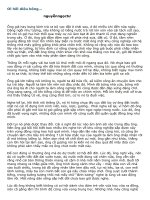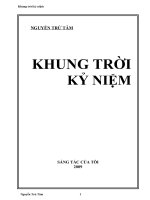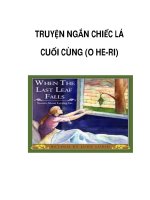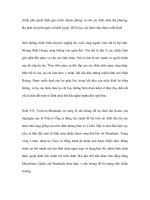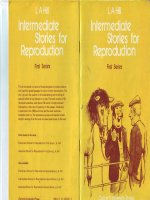Truyen ngan cua LA HILL (BOOK 2)
Bạn đang xem bản rút gọn của tài liệu. Xem và tải ngay bản đầy đủ của tài liệu tại đây (2.52 MB, 61 trang )
Elementary Stories
for Reproduction
Second Series
L.A. HILL
OXFORD UNIVERSITY PRESS
4
1
Jack was a young sailor. He lived in England, but he was often away with his
ship.
One summer he came back from a long voyage and found new neighbours
near his mother’s house. They had a pretty daughter, and Jack soon loved her
very much.
He said to her, ‘My next voyage will begin in a few days’ time, Gloria. I love
you, and I’ll marry you when I come back. I’ll think about you all the time, and
I’ll write to you and send you a present from every port.’
Jack’s first port was Freetown in Africa, and he sent Gloria a parrot from
there. It spoke five languages.
When Jack’s ship reached Australia, there was a letter from Gloria. It said,
‘Thank you for the parrot, Jack. It tasted much better than a chicken.’
Words outside the 1000: parrot, sailor
5
A. Answer these questions.
1. Why did Jack make long voyages?
2. Where did Gloria live?
3. Why did Jack think about Gloria all the time?
4. Where did Jack send Gloria the parrot from?
5. Where did Jack get Gloria’s letter about the parrot?
6. What did Gloria do to the parrot?
B. Which words in the story on page 4 mean the opposite of:
1. short 4. old 7. worse
2. last 3. little
3. ugly 6. winter
C. Write this story. Put one word in each empty place. You will find all
the correct words in the story on page 4.
Freetown is a . . . . in West Africa. Jack and another . . . . from his ship
went into a shop there and saw a beautiful bird. It was a red and grey . . . . and
it . . . . ‘Hullo,’ to them. Jack said to his friend, ‘I’m going . . . . it to Gloria.
She’s the daughter of my mother’s . . . . It will be a nice . . . . for her,’ Then
Jack and his friend . . . . a restaurant and ate . . . . and fried potatoes there.
They . . . . very good.
6
2
Fanny and Ethel worked in the same office, and, they were neighbours at home.
Fanny was rather a careless girl, and he often lost things. Then she usually went
to Ethel to borrow more from her.
Ethel was a kind girl, but she sometimes got tired of lending things to her
friend.
One Saturday afternoon Fanny knocked at Ethel’s front door, and when
Ethel came to open it, Fanny said to her, ‘Oh, hullo, Ethel. Please lend me a bag.
I’ve lost mine. I’m going to the shops, and I feel very stupid when I haven’t got
anything in my hand when I go out in the street.’
Ethel laughed and answered, ‘Well, Fanny, go down to the end of the
garden. You’ll find a nice wheelbarrow in the shed there. Take that when you go
down to the shops. Then you’ll have something in both of your hands.’
Word outside the 1000: wheelbarrow
7
A. Answer these questions.
1.Why did Fanny often lose things?
2.Why did Ethel lend things to Fanny?
3.Why didn’t Fanny want to go to the shops without a bag?
4.Why didn’t Ethel lend her a bag?
5.What did she want Fanny to take to the shops?
6.Did Fanny take it, do you think?
B. Which of these sentences are true? Write the correct ones down.
1.Ethel often borrowed things.
2.Fanny often borrowed things.
3.Ethel often lent things to Fanny.
4.Fanny often lent things to Ethel.
5.One day Ethel lost her bag.
6.One day Fanny lost her bag.
7.Fanny liked carrying something in her hand.
8.Fanny did not like carrying things.
9. There was a shed at the end of Ethel’s garden.
10. There was a shed at the end of Fanny’s garden.
C. Write this story, but do not put pictures: put words.
Ethel’s house is in a small . It has a small
at the back, and there is a in it. Ethel keeps her
there. Ethel is a clever . She works in a .
This is Ethel. She is at the
of her house, and she’s got a
in her left , because she is going to the .
8
3
Dave married, and when his new wife saw the clothes in his cupboard, she said,
‘Dave, you have only got one good shirt. The others are very old, and they’ve got
holes in them. I’m going to buy you a new one this afternoon.’
Dave liked his old shirts, but he loved his wife too, so he said, ‘All right,
Beryl, but please don’t throw any of the old ones away.’
Dave went to work, and when he came back in the evening, Beryl said to
him, ‘Look, Dave, I’ve bought you a nice shirt. Here it is. Put it on.’
Dave put the shirt on, and then he said, ‘Look at the sleeves, Beryl. They’re
too long.’
‘That’s all right,’ Beryl answered. ‘They’ll get shorter when I wash the shirt.’
Then Dave said, ‘But the neck’s too small.’
‘That’s all right,’ Beryl answered. ‘It’ll get bigger when you wear the shirt,
Dave.’
Word outside the 1000: sleeve
9
A. Answer these questions.
1. Why did Beryl want to buy Dave a new shirt?
2. Why didn’t Dave want his wife to throw any of his old shirts away?
3. Why didn’t Dave like the sleeves of his new shirt?
4. What did Beryl say about the sleeves?
5. Why didn’t Dave like the collar of the shirt?
6. What did Beryl say about the collar?
B.
Opposites.
Write these sentences. Put one word in each empty place.
1.New clothes do not have holes in them, but . . . ones sometimes
do.
2. Sleeves don’t get . . . when you wash them. They get shorter.
3. Good shirts are not cheap. They are . . . .
4. The neck of Dave’s shirt wasn’t too big. It was too . . . .
5. Dave loved his old shirts, but he . . . his new one.
C. Choose the right sentence for each picture and write it down.
1. a. None of these shirts has got holes in it.
b. Some of these shirts have got holes in them.
c. All of these shirts have got holes in them.
2. a. The sleeves are too long,
and the collar is too small.
b. The sleeves are too short,
and the collar is too small.
c. The sleeves are too short,
and the collar is too big.
d. The sleeves are too long,
and the collar is too big.
10
4
Mrs. Williams lived in a small street in London, and now she had a new
neighbour. Her name was Mrs. Briggs, and she talked a lot about her expensive
furniture, her beautiful carpets and her new kitchen.
‘Do you know,’ she said to Mrs. Williams one day, ‘I’ve got a new
dishwasher. It washes the plates and glasses and knives and forks beautifully.’
‘Oh?’ Mrs. Williams answered. ‘And does it dry them and put them in the
cupboard too?’
Mrs. Briggs was surprised. ‘Well,’ she answered, ‘the things in the machine
are dry after an hour, but it doesn’t put them away, of course.’
‘I’ve had a dishwasher for twelve and a half years,’ Mrs. Williams said.
‘Oh?’ Mrs. Briggs answered. ‘And does yours put the things in the cupboard
when it has washed them?’ She laughed nastily.
‘Yes, he does,’ Mrs. Williams answered. ‘He dries the dishes and puts them
away.’
Word outside the 1000: dishwasher
11
A. Answer these questions.
1. Where did Mrs. Briggs live?
2. Why was Mrs. Briggs surprised?
3. Did Mrs. Briggs’s dishwasher dry the plates and other things?
4. Did it put them away?
5. Did Mrs. Williams’s dishwasher put the things in the cupboard?
6. Who was Mrs. Williams’s dishwasher?
B. Write these sentences. Put one of these words in each empty place:
an any no none some
1. Mrs. Briggs was rich, but Mrs. Williams was not. Mrs. Briggs had
. . . beautiful carpets, but Mrs. Williams didn’t have . . . .
2. Mrs. Briggs had . . . expensive furniture, but Mrs. Williams had . . . .
3. Mrs. Briggs had . . . expensive dishwasher, but Mrs. Williams did
not have . . . machines in her kitchen.
4. Mrs. Briggs had . . . nice roses in her garden, but Mrs. Williams had
. . . flowers in hers.
5. Mrs. Briggs had . . . big trees in her garden too, but Mrs. Williams
had . . . .
C. Write this story. Put one of these words in each empty place:
he him his her it its she
Mrs. Williams had a good baby: . . . never cried, and . . . clothes were
always clean. Mrs. Briggs was very surprised and said, ‘When my daughter
was small, I gave . . . lots of food, but . . . cried a lot, and . . . clothes were
always dirty. Why is your baby so different? How do you do . . . ?’
‘Well,’ answered Mrs. Williams, ‘my first child was a boy. I always gave
. . . a lot of food, . . . got very fat, and . . . stomach was always full. He
cried a lot and was dirty. Now I give my new baby much less, and . . . is
happy and clean.’
12
5
One day a man went to see his doctor and said to him, ‘I’ve swallowed a horse,
doctor, and I feel very ill.’
The doctor thought for a few seconds and then said, ‘All right, Mr. Lloyd, I’ll
help you. Please lie down on this bed.’
The doctor’s nurse gave the man an injection, the man went to sleep, and the
doctor went out quickly to look for a horse in the town.
After half an hour he found one, borrowed it and took it into his office, so
when Mr. Lloyd woke up, it was there in front of him.
‘Here’s the horse, Mr. Lloyd,’ the doctor said. ‘I’ve taken it out of your
stomach, and it won’t give you any more trouble now.’
At first Mr. Lloyd was happy, but then he looked at the horse again and said,
‘But, doctor, my horse was white, and this one’s brown!’
Word outside the 1000: swallowed
13
A. Answer these questions.
1. Did the doctor think, ‘This man has really swallowed a horse’?
2. Why did the nurse give the man an injection?
3. What did the doctor do when he went out?
4. What did Mr. Lloyd see when he woke up?
5. Why was Mr. Lloyd not happy when he looked at the horse
more carefully?
B. Which words in the story on page 12 mean:
1. sick 3. visit 5. discovered
2. pleased 4. fast
. Put the number of the correct sentence under the correct picture.
1. The nurse gave Mr. Lloyd an injection.
2. The doctor went out into the street.
3. Mr. Lloyd said, ‘I feel very ill.’
4. Mr. Lloyd woke up.
5. Mr. Lloyd came into the doctor’s office.
6. Mr. Lloyd went to sleep.
14
6
A history teacher was talking to his class about the ancient Romans.
‘They were very strong, brave people, and they were good soldiers,’ he said.
‘They always wanted to have strong bodies, so they played a lot of games.’
‘Did they like swimming?’ one of the girls asked. ‘That makes people’s
bodies strong.’ She was very good at swimming.
‘Oh, yes, some of them swam a lot,’ the teacher answered. Then he told
them a story about one famous Roman.
‘There was a big, wide river in the middle of Rome,’ he said. ‘It was the
Tiber, and this man swam across it three times every day before breakfast.’
The girl laughed when she heard this.
‘Why are you laughing?’ the teacher asked her angrily. ‘Have I said anything
funny?’
‘Well, sir,’ the girl answered, ‘Why didn’t he swim across the river four times,
to get back to his clothes again?’
Word outside the 1000: ancient
15
A. Answer these questions.
1. Why did the ancient Romans play a lot of games?
2. Why was one of the girls interested in swimming?
3. Who swam across the Tiber before breakfast?
4. Why was the teacher angry?
5. Why did the girl laugh?
B. Which of the answers to these questions are right? Write the correct
ones.
1. What did the teacher
in this story teach?
a. Swimming.
b. Games.
c. History.
2. When the teacher said,
‘Some of them swam a lot’,
who was he talking about?
a. The Romans.
b. The girls in his class.
c. Strong people.
3. Why did the girl laugh?
a. Because the Roman swam
before breakfast.
b. Because the Roman
did not finish swimming
near his clothes.
c. Because the teacher
was angry.
Word outside the 1000: puzzle
16
7
Betty Brown was five years old, and her mother wanted her to begin going to
school, because she wanted to start working in an office again.
A month before the beginning of the school year Mrs. Brown began telling
Betty about school. ‘It’s very nice,’ she said. ‘You’ll play games and paint pictures
and sing songs.’
Mrs. Brown began doing these things with Betty. Betty liked the games and
the painting and the singing very much, but she always wanted to be near her
mother, so Mrs. Brown was rather afraid and thought, ‘What will she do when I
leave her at school?’
But on the first day at school Betty was very good. She did not cry, and she
was happy.
On the second morning Mrs. Brown said, ‘Put your clothes on, Betty. I’m
going to take you to school in half an hour's time.’
‘School?’ Betty said. ‘But I’ve been to school!’
17
A. Answer these questions.
1. Why did Mrs. Brown want to send her daughter to school?
2. What did Mrs. Brown do to make Betty like school?
3. Why was Mrs. Brown afraid?
4. Did Betty like school when she went there?
5. Why was Betty surprised when her mother said, ‘I’m going to
take you to school in half an hour’s time on the second morning?
(Because she thought, ‘. . . .’)
B. What words in the story on page 16 mean the opposite of:
1. nasty 4. young 7. far from
2. bad 3. after
3. sad 6. little
C. Write this story. Put one of these words in each empty place:
do does doing make makes making
Our children don’t . . . much homework, but they . . . a lot of work in
school. My son George likes . . . furniture and things like that more than . .
. lessons. He sometimes . . . nice chairs out of old boxes in his class. He
and his friends . . . a lot of noise while they are working, of course.
George is good at sport: he . . . the high jump very well. Such sport . . .
children a lot of good, I think. Don’t you?
18
8
One morning Mrs. Perry said to her husband, ‘Jack, there’s a meeting of our
ladies’ club at Mrs. Young’s house at lunch time today, and I want to go to it. I’ll
leave you some food for your lunch. Is that all right?’
‘Oh, yes,’ her husband answered, that’s quite all right. What are you going to
leave for my lunch?’
‘This tin of fish,’ Mrs. Perry said. ‘And there are some cold, boiled potatoes
and some beans here, too.’
‘Good,’ Mr. Perry answered. I’ll have a good lunch.’
So Mrs. Perry went to her meeting. All the ladies had lunch at Mrs. Young’s
house, and at three o’clock Mrs. Perry came home.
‘Was your fish nice, Jack?’ she asked.
‘Yes, but my feet are hurting,’ he answered.
‘Why are they hurting?’ Mrs. Perry asked.
‘Well, the words on the tin were, “Open tin and stand in hot water for five
minutes”.’
Word outside the 1000: stand (here meaning ‘put it’)
19
A. Answer these questions.
1. Why didn’t Mrs. Perry want to cook her husband’s lunch?
2. What did she leave him for his lunch?
3. Did Mr. Perry enjoy his lunch?
4. What was the matter with his feet?
5. What mistake did Mr. Perry make when he read the words on the tin?
B. Which of these sentences are true? Write the correct ones down.
1. Mrs. Perry wanted to belong to a ladies’ club.
2. Mrs. Perry belonged to a ladies’ club.
3. Mrs. Perry did not cook her husband’s lunch that day.
4. Mrs. Perry cooked the lunch for her husband that day.
5. Mrs. Perry had lunch with several ladies.
6. Mrs. Perry had lunch with Mrs. Young only.
7. Mr. Perry didn’t like his lunch.
8. Mr. Perry liked his lunch.
9. Mr. Perry put the tin of fish in hot water.
10. Mr. Perry put his feet in hot water.
C. Write this story, but do not put pictures: put words.
Some
are in the kitchen of a big .
They are making lunch for a of their club. One
lady has got some big
, of. . Another is
putting some
in , and the third is
cutting some
into pieces. The ladies of the club
like nice
. What is that lady doing? Oh, she is sitting
down, because her
are tired.
20
9
Miss Green was very fat. She weighed 100 kilos, and she was getting heavier
every month, so she went to see her doctor.
He said, ‘You need a diet, Miss Green, and I’ve got a good one here.’ He
gave her a small book and said, ‘Read this carefully and eat the things on page 11
every day. Then come back and see me in two weeks’ time.’
Miss Green came again two weeks later, but she wasn’t thinner: she was
fatter. The doctor was surprised and said, ‘Are you eating the things on page 11
of the small book?’
‘Yes, doctor,’ she answered.
The next day the doctor visited Miss Green during her dinner. She was very
surprised to see him.
‘Miss Green,’ he said, ‘Why are you eating potatoes and bread? They aren’t in
your diet.’
‘But, doctor,’ Miss Green answered, ‘I ate my diet at lunch time. This is my
dinner.’
Word outside the 1000: diet
21
A. Answer these questions.
1. Why did Miss Green go to see her doctor?
2. How did the doctor try to help her?
3. Did she get thinner?
4. Did she eat the things on page 11 of the book?
5. Why didn’t she get thinner?
22
10
Rose left school when she was seventeen years old and went to a college for a
year to learn to type. She passed her examinations quite well and then went to
look for work. She was still living with her parents.
A lot of people were looking for typists at that time, so it was not difficult to
find interesting work. Rose went to several offices, and then chose one of them.
It was near her parents’ house. She thought, ‘I’ll walk there every morning. I
won’t need to go by bus.’
She went to the office again and said to the manager, ‘I want to work here,
but what will you pay me?’
‘We’ll pay you £27 now,’ the manager answered, ‘and £30 after three
months.’
Rose thought for a few seconds before she answered. Then she said, ‘All
right, then I’ll start in three months’ time.’
A. Answer these questions.
1. Why was it easy to find interesting work?
2. Why did Rose want to work in an office near her parents’ house?
Word outside the 1000: manager
23
3. Why did Rose go to one office again?
4. Whom did she talk to there?
5. Why did she want to start working there in three months’ time?
B. Put one, two or three words in each of the empty places in these
sentences:
1. Rose 60%
Sally 70%
Judy 90%
Rose passed her examinations well. Sally passed them . . . ; and Judy
passed them . . . .
2.
x38
73456
1432
2
x 245
2
126
543
3
The sum on the left is difficult. The one in the middle is . . . .
The one on the right is . . . .
3. Office A is quite near Rose’s house,
but Office B is . . . , and Office C is
. . . .
C. Choose the right sentence for each picture. Write it down.
1. a. Rose is working in an office.
b. Rose is studying in her college.
c. Rose is doing an examination.
2. a. Rose is getting on a bus.
b. Rose is getting off a bus.
c. Rose is going past a bus.
3. a. Rose is talking to the manager.
b. Rose is typing a letter for the manager.
c. Rose is giving the manager a letter.
24
11
Mr. Day was a teacher at a school in a big city in the north of England. He
usually went to France or Germany for a few weeks during his summer holidays,
and he spoke French and German quite well.
But one year Mr. Day said to one of his friends, ‘I’m going to have a holiday
in Athens. But I don’t speak Greek, so I’ll go to evening classes and have Greek
lessons for a month before I go.’
He studied very hard for a month, and then his holidays began and he went
to Greece.
When he came back a few weeks later, his friend said to him, ‘Did you have
any trouble with your Greek when you were in Athens, Dick?’
‘No, I didn’t have any trouble with it,’ answered Mr. Day. ‘But the Greeks
did!’
Word outside the 1000: puzzle
25
A. Answer these questions.
1. Where did Mr. Day usually spend some time during his holidays?
2. Why did he want to have Greek lessons?
3. Where did he go to learn Greek?
4. How long did he stay in Greece?
5. How much did his Greek help him while he was in Greece?
B. Which of the answers to these questions are right? Write them down.
1. Why did Mr. Day have Greek lessons?
a. Because he liked evening classes.
b. Because he wanted to visit Greece.
c. Because he did not like French and German.
2. How long did Mr. Day stay in Greece?
a. A month.
b. A few weeks.
c. One year.
3. What did the Greeks have trouble with?
a. Mr. Day’s Greek.
b. Mr. Day’s friend.
c. Mr. Day’s holiday.
26
12
Mr. Pearce liked shooting ducks very much. Whenever he had a free day, he
went out shooting with his friends.
But one summer he said to himself, ‘I’ve never been to the mountains. My
holidays are going to begin soon, so I’m going to go to the mountains and shoot
deer. They’re more interesting than ducks, I think.’
So when his holidays began, Mr. Pearce went to the station, bought his ticket
and was soon in the mountains.
He got out at a small station and walked through fields and forests for a few
kilometres. Then he saw a farmer in a field. ‘Good morning,’ Mr. Pearce said to
him. ‘Are there any deer here?’
‘Well,’ answered the farmer slowly, ‘there was one last year, but all the
gentlemen from the town came and shot at it, and it’s gone somewhere else now,
I think.’
Word outside the 1000: deer
27
A. Answer these questions.
1. What sport did Mr. Pearce enjoy most?
2. Why did he want to go to the mountains?
3. How did he go to the mountains?
4. Whom did he speak to there?
5. Why did the deer go away from that place?
B.
Opposites.
Write these sentences. Put one word in each empty place.
1. Mr. Pearce wasn’t free last week. He was very . . . .
2. His holidays began on the 15th of June, and they . . . on the 29th.
3. The farmer did not speak . . . he spoke slowly.
4. When the gentlemen from the town shot at the deer, they
never hit it: they always . . . it.
5. Mr. Pearce has often shot ducks, but he has . . . shot a deer.
C. Put the number of the correct sentence under the correct picture.
1. Mr. Pearce got into a train.
2. ‘The deer has gone away.’
3. Mr. Pearce met a farmer.
4. Mr. Pearce often shot ducks.
5. Mr. Pearce was in the mountains now.
6. Mr. Pearce got out again.
